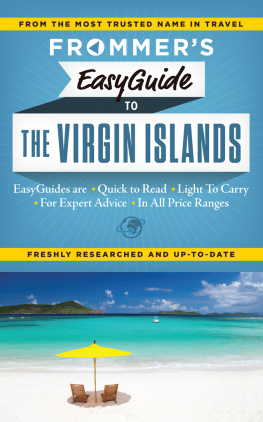Published by State University of New York Press, Albany
2021 State University of New York
All rights reserved
Printed in the United States of America
No part of this book may be used or reproduced in any manner whatsoever without written permission. No part of this book may be stored in a retrieval system or transmitted in any form or by any means including electronic, electrostatic, magnetic tape, mechanical, photocopying, recording, or otherwise without the prior permission in writing of the publisher.
For information, contact State University of New York Press, Albany, NY
www.sunypress.edu
Library of Congress Cataloging-in-Publication Data
Name: Navarro, Tami, author.
Title: Virgin capital : race, gender, and financialization in the US Virgin Islands / Tami Navarro.
Description: Albany : State University of New York Press, [2021] | Includes bibliographical references and index.
Identifiers: ISBN 9781438486031 (hardcover : alk. paper) | ISBN 9781438486048 (ebook)
Further information is available at the Library of Congress.
10987654321
For my mother.Acknowledgments
In some form or another, I have been researching the Economic Development Commission (EDC) program since 2003 and have been the recipient of unspeakable grace along the way. Virgin Capital began at Duke University where I was gifted with the incomparable direction of Deborah A. Thomas. Deb, you are an incredible mentor, teacher, model, and aspiration. I am an anthropologist because of you. At Duke, I also had the good fortune to work with and learn from Anne Allison, Charles Piot, Orin Starn, Lee Baker, and Mark Anthony Neal. Ian Baucom and Karla Slocum graciously served on my dissertation committee and strengthened my analysis in critical ways. In graduate school, I was fortunate have a deeply committed community of fellow scholars-in-the-making who helped me find my voice: Bianca Williams, Micah Gilmer, Jamaica Gilmer, Attiya Ahmad, and the late Johnetta Pressley were my champions. Your friendship sustained me.
After leaving Duke, life brought me back to Middletown, Connecticut, in the form of a visiting professor stint at Wesleyan University, where I had begun my academic journey and where I was reunited with the brilliant and generous Kehaulani Kauanui and Krishna Winston. I thank them both for modeling what rigorous and engaged scholarship looks like. Thank you to Dorothy Hodgson, who took a chance on my work and offered me an incredibly generative postdoctoral fellowship at Rutgers.
A number of institutions have provided the funding that have enabled me to complete this project: The Center for Latin American and Caribbean Studies at Duke allowed me to conduct much early fieldwork on St. Croix, and a fieldwork grant from the Wenner-Gren Foundation funded my extended fieldwork. The period of writing is challenging for many academics, and my own such time in the wilderness was made much easier by a dissertation fellowship from the Ford Foundation.
At Barnard College, the community of scholars I encounteredmany of whom are now friendshas elevated my work. To Janet Jakobsen, thank you for your consistent demonstration of your belief in my work. Tina Campt is a force to be reckoned with and I continue to learn from her. Thank you for sharing your scholarship, your approach to collaboration, and your razor-sharp wit. Elizabeth Castelli, your dedication to ethical living and community building is an inspiration. One of the happiest surprises of being at Barnard has been working with Kaiama L. Glover. Thank you for joining me in crafting Critical Caribbean Feminisms and Writing Home. The work we do together is restorative. Monica Miller, Yvette Christians, Maja Horn, Neferti Tadiar, Paige West, Pam Philips, Hope Dector, Avi Cummings, Premilla Nadasen, Celia Naylor, Miriam Neptune, Natasha Lightfoot, and Eve Kausch have all made Barnard a welcoming and productive space for me and I am indebted to them all.
In the New York area, I have benefited greatly from the insight and support of Vanessa K. Valds, Dna-Ain Davis, and David Scott. As a scholar, I believe deeply in the value of intellectual collaboration and have been fortunate to be included in several spaces of cothinking and cowriting: Thank you to the KRUSH writing group (Abosede George, Kimuli Kasara, and Molly Tambor). Our deadlines and mutual accountability are a large part of the reason this book is in the world. To my fellow members of the Virgin Islands Studies Collective (VISCO)LaVaughn Belle, Hadiya Sewer, and Tiphanie Yanique: your work, zeal, and politics continue to energize me. What a world we are making for ourselves. At Barnard, both the Gender Justice and Neoliberal Transformations working group and the Transnational Black Feminisms working group have been profoundly productive spaces for my present and future scholarship. Over the course of this project, I have shared portions of this manuscript in lectures at the University of the West Indies, Cave Hill, and have been honored by the collegiality and warmth of Tonya Haynes, Halimah DeShong, Veronica Jones, and Charmaine Crawford.
St. Croix is such a large part of my life that it took me many years to find a balance between inhabiting it as home and engaging my work there as time in the field. It remains a tricky balancea slippery slope in either direction. In any case, my friends and informants on St. Croix are the heart of this project. Nicole Y. Canegata, Ana Castillo, Emily Graci, Deanna James, and Quiana Adams kept me going in the early (and middle and late) days of fieldwork. Anthony Weeks and Governor Albert Bryan gave generously of their time and expertise. We view many things differently, but their insight and perspectives have greatly enriched this book.
This book has been shepherded into the world by my wonderful editor, Rebecca Colesworthy, who has believed in this project from the day we met. Marisa Escolar has also helped to make this a better book, for which I am grateful.
My deepest thanks are reserved for my family, who have endured countless conference hotels, lectures, and drafts. Richard, Ella, and Judah, we have made something together that is larger than any of us. I am humbled every day. To my mother, Ursula Navarro, thank you for making this life possible for me. To Seeranie Seewah, Susi Persaud, and Amanda Bonilla, the love, support, and care you provide keep us moving forward. I became a mother during the course of this project and had no idea how that change would shift my world and ability to write. Clarissa Caban, Keena Utley, and Zaryah Aparicio have done me the honor of minding my children so that I might put these words on the page. Thank you.
The epigraph on page viii is from the poem entitled Judiths Fancy by Audre Lorde, taken from The Marvelous Arithmetics of Distance: Poems, 19871992. Permission has been granted by W. W. Norton & Company, Inc.
This book has taken a long time to come into the world, but as it has been said, time is not counted from daylight, but from midnight.











